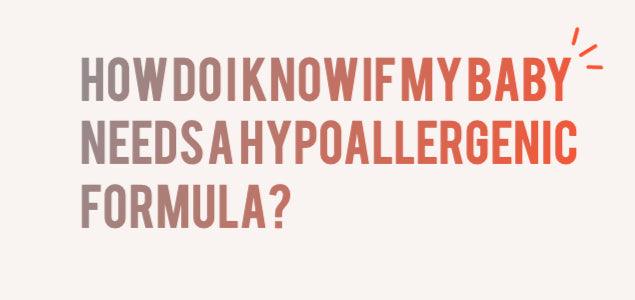As a parent, your baby's health and well-being are your top priorities. One of the most critical decisions you'll make during their early months is what to feed them. For many, the choice is between breastfeeding and formula feeding. However, some babies may require a specialized diet due to allergies or sensitivities, which is where hypoallergenic formulas come into play. But how do you know if your baby needs a hypoallergenic formula? Let's delve into this topic.
Understanding Hypoallergenic Formula
Before we delve into the signs that your baby may need a hypoallergenic formula, it's essential to understand what it is. A hypoallergenic formula is designed for infants who have difficulty digesting regular cow's milk or soy-based formulas or those who are allergic to them. These formulas break down proteins into smaller particles that are easier for the baby's digestive system to handle.
Signs Your Baby May Need Hypoallergenic Formula
1. Digestive Issues:
One of the first signs that your baby may need a hypoallergenic formula is persistent digestive issues. These can include excessive gas, diarrhea, vomiting after meals, or constipation. While occasional digestive problems are normal in infants as their systems mature, persistent issues could indicate an intolerance or allergy.
2. Skin Reactions:
Another sign that your baby might benefit from a hypoallergenic formula is if they have skin reactions after feeding. This could include eczema (dry, red, itchy skin), hives (red welts on the skin), or even swelling around the mouth and face.
3. Respiratory Problems:
Respiratory problems like wheezing, coughing, or difficulty breathing can also be signs of an allergic reaction to their current formula.
4. Failure To Thrive:
If your baby is not gaining weight as expected or is losing weight, it could be a sign that they are not absorbing nutrients properly due to an allergy or intolerance.
Consulting with Your Pediatrician
If you notice any of these signs, it's essential to consult with your pediatrician. They can help determine if the symptoms are indeed due to a formula intolerance or allergy and guide you on the next steps. This may involve testing to confirm an allergy and discussing different hypoallergenic formula options.
Choosing the Right Hypoallergenic Formula
Once you've determined that your baby needs a hypoallergenic formula, the next step is choosing the right one. There are several types available, including extensively hydrolyzed formulas (where proteins are broken down into smaller particles), partially hydrolyzed formulas (where proteins are broken down but not as much), and amino acid-based formulas (which contain protein in its simplest form).
Once you've consulted with your pediatrician and determined that your baby needs a hypoallergenic formula, HiPP HA could be an excellent option to consider. HiPP HA is a European formula specifically designed for infants who show signs of allergies and sensitivities. It is made using hydrolyzed proteins, which are proteins broken down into smaller sizes that are easier for babies to digest and less likely to cause allergic reactions.
Key Features of HiPP HA:
- Hydrolyzed Proteins: The proteins in HiPP HA are extensively hydrolyzed to minimize allergenic properties, making it suitable for babies with cow's milk protein allergy.
- Reduced Allergen Formula: HiPP HA reduces the risk of allergic reactions by carefully selecting ingredients and avoiding common allergens.
- Enriched with Nutrients: This formula is fortified with essential nutrients such as Omega-3 and Omega-6 fatty acids, which are crucial for your baby’s cognitive and visual development.
- Digestive Support: It also contains prebiotics and probiotics to support a healthy gut flora, which is essential for babies with sensitive digestive systems.
Knowing whether your baby needs a hypoallergenic formula can be challenging, but by watching for signs of digestive issues, skin reactions, respiratory problems, and failure to thrive, you can identify potential problems early. Always consult with your pediatrician if you suspect your baby may need a different type of formula. They can provide expert guidance and help ensure your little one gets the nutrition they need in a form they can tolerate.
Remember that every baby is unique and what works for one might not work for another. With patience and guidance from healthcare professionals, you'll find the best feeding solution for your little one.


























